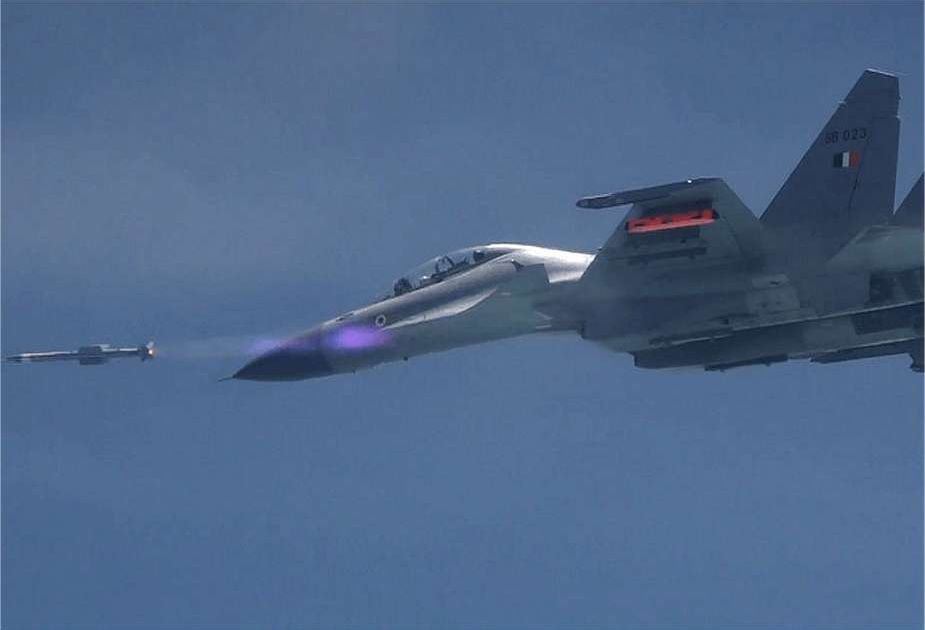Breaking News
Armenia Seeks Procurement of Indian Astra Missiles and Su-30 Fighter Jet Upgrades.
Armenia has reached out to India in a bid to strengthen its military capabilities, with discussions centered on the potential procurement of Astra air-to-air missiles and upgrades for its fleet of Su-30 fighter jets, according to a report published by *The Print* on September 14, 2024.
Follow Army Recognition on Google News at this link

Astra air-to-air missile launched by Indian Air Force Su-30 fighter aircraft. (Picture source: Wikimedia)
The Armenian government is reportedly exploring the purchase of Indian-made missiles, including the highly acclaimed indigenous Astra beyond-visual-range (BVR) air-to-air missile. Armenia is keen to bolster its air defense systems amid regional security concerns, and the Astra missile—designed for engaging enemy aircraft at long distances—has emerged as a key component of its modernization efforts.
The Astra missile, developed by India's Defence Research and Development Organisation (DRDO), has garnered attention for its precision, long-range capabilities, and integration into Indian Air Force platforms like the Sukhoi Su-30MKI and Tejas fighter jets. Capable of engaging targets up to 110 kilometers away, the missile features an active radar homing seeker, ensuring high kill probability in combat situations.
For Armenia, the Astra BVR air-to-aqir missile offers an opportunity to upgrade its air-to-air combat readiness, especially as it faces complex regional dynamics and security threats. Discussions with India on missile procurement are seen as part of a broader initiative to modernize the Armenian military and enhance its self-defense capabilities.
In addition to exploring missile procurement, Armenia is also interested in potential upgrades to its existing fleet of Sukhoi-30 (Su-30) fighter aircraft. According to *The Print*, Armenia is considering collaborating with India to improve the combat effectiveness and operational range of its Su-30s. India, which operates one of the largest fleets of Su-30MKI jets, has extensive experience in upgrading and customizing these aircraft, particularly in integrating modern avionics and weapon systems.
The Su-30 is a twin-engine, multirole air superiority fighter, and any potential upgrades could enhance Armenia's air power significantly. The modernization could include enhancements to radar systems, improved electronic warfare capabilities, and the integration of new air-to-ground and air-to-air weapons.
Armenia's outreach to India highlights the growing defense cooperation between the two nations. Over the past few years, Yerevan has turned to New Delhi to diversify its defense procurement sources and reduce dependence on traditional suppliers. India, for its part, has been expanding its defense exports, aligning with its "Make in India" initiative to boost indigenous defense production.
If the deals materialize, Armenia could become one of the key buyers of Indian defense technology in the region, marking a significant step forward in bilateral ties. Armenia’s pursuit of Indian missile systems and aircraft upgrades underscores its intent to build a more robust and modernized military in response to evolving security challenges.
Armenia’s pursuit of military equipment, including Indian-made missiles and aircraft upgrades, is heavily influenced by its complex regional security environment, characterized by tense relations with several of its neighbors. The country’s defense posture is shaped primarily by its longstanding conflict with Azerbaijan, tensions with Turkey, and its evolving ties with Russia and other regional powers.
The most significant factor in Armenia’s military strategy is its ongoing conflict with Azerbaijan, centered on the disputed Nagorno-Karabakh region. The two countries have fought several wars over this territory, the most recent in 2020, when Azerbaijan achieved significant territorial gains with the support of Turkish drones and modern military equipment.
The 2020 conflict exposed gaps in Armenia’s military capabilities, particularly in terms of air defense, drone warfare, and long-range missile systems. Since the end of the war, Armenia has been seeking to rebuild and modernize its armed forces to prepare for potential future clashes with Azerbaijan, which continues to invest heavily in modern weapons, primarily supplied by Turkey and Israel.
Armenia’s interest in acquiring the Astra BVR missile and upgrading its Su-30 fighters from India is likely driven by the need to counter Azerbaijan’s advanced air assets and drones. Strengthening air defense and enhancing the capabilities of its air force are seen as crucial steps for Armenia to maintain a credible deterrence against Azerbaijan.
Armenia’s decision to reach out to India for advanced military equipment, including the Astra BVR missiles and fighter jet upgrades, is a response to its complex regional challenges. The ongoing conflict with Azerbaijan, coupled with the broader regional influence of Turkey, is driving Armenia to seek new military partnerships and enhance its defense capabilities. While Russia remains a key player in Armenia’s security architecture, the country’s pursuit of alternative suppliers like India reflects a broader strategy to modernize its military and maintain a credible deterrence against its neighbors.


























